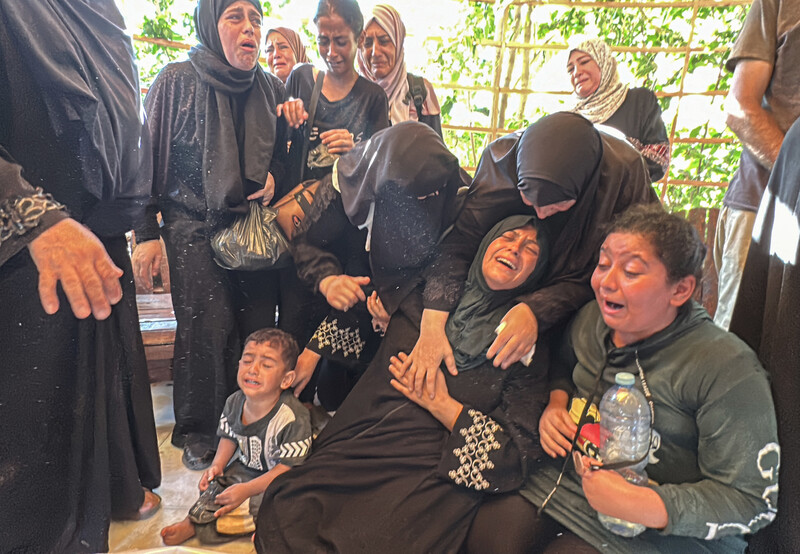The Electronic Intifada 3 October 2024

Relatives grieve their loved ones at the Nasser hospital morgue on 13 August 2024.
APA imagesThough there are no in-class lessons any more in Gaza, where every university has been damaged or destroyed in Israel’s genocidal aggression, I am continuing my journalism studies.
Al-Azhar University, where I am taking my degree, has managed to establish online courses in order for students to continue their studies.
We do so remotely, at the mercy of our mobile phone batteries. But I am determined to graduate and to document all of Israel’s crimes.
In September, one of my professors set us a photo assignment.
I decided to go to the Nasser Medical Complex to take pictures. Over several days, I saw many injured and sick people, but one older woman caught my attention because she was there, every day, in the same place.
Her name was Ikhlas al-Hussaini. She told me she was “around 70.”
Ikhlas cried a lot. She told me that the Israeli military had first killed her husband and then, a few weeks later, her three sons, Eid, 31, Ahmed, 26, and Khaled, 17.
They were all martyred, she explained, in January. Her husband and their three sons had just left the house to find bread, when a bomb struck.
The father died and the sons, all severely injured, were taken to Nasser hospital. Eid had his legs amputated, Ahmed had both feet and hands amputated, and Khaled suffered serious burns as well as multiple injuries from shrapnel.
But they turned out not to be safe in the hospital. In mid January, the Israeli military laid siege to the hospital, a siege that would last weeks.
Fatal shell
At one point, early in the siege, the military shelled the complex. One shell landed inside the room where Ikhlas and her sons were.
“Two of my sons fell as martyrs in front of me, and Khaled was wounded again,” Ikhlas told me.
“I hugged Khaled and screamed for the doctors, but they were unable to reach us. Khaled died in my arms. He bled a lot and his body was full of wounds and burns.”
But they were still trapped, and for three days, they were trapped without food or water. Finally, the military allowed those inside to leave, though without taking anything and forcing them to take the long road south to Rafah.
“They just wanted to torture us,” Ikhlas said.
She walked all the way south, nonetheless, she said, carrying nothing except a piece of cloth from her youngest son’s shirt, stained with his blood. She never got to bury her children.
Ikhlas now comes every day to the hospital.
And once a month, on the day her sons were killed, she goes to the mass grave that was subsequently found in the grounds of Nasser hospital and reads the Holy Quran to her sons.
“I speak to them to tell them that the world has failed us,” she said. “I tell them how much I love them.”
Weam Hossam Al-Banna is a journalist student from Gaza.


